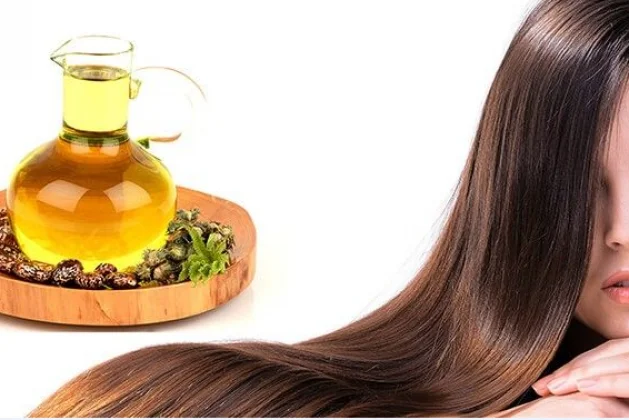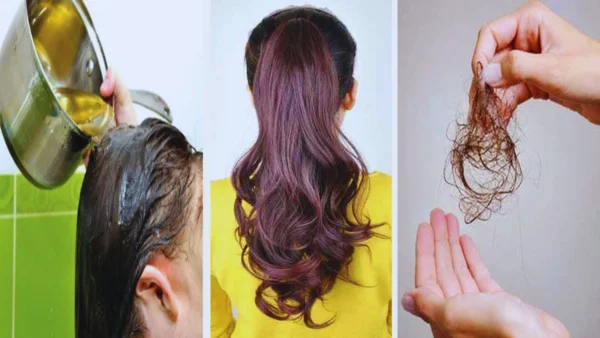What is castor oil?
Castor oil for hair is a vegetable oil derived from castor beans and is usually colorless, but can also be yellow or dark brown, depending on how it is made. Jamaican black castor oil is one of the most common types and has a thicker consistency, as it is boiled with ash, giving it a warm, roasted aroma.
Castor oil is rich in ricinoleic acid, an anti-inflammatory fatty acid that moisturizes and soothes, making it an ideal oil for dry scalps and even drier hair. Castor oil is rich in long-chain fatty acids, which means it has the ability to deliver proteins and nutrients to your hair follicles and help prevent inflammation in those follicles. But do these healthy hair proteins actually work to grow hair?
How often you apply castor oil to your hair depends on your hair type. However, using castor oil on your hair every day is generally not recommended. There is no standard on how often you should use castor oil on your hair, but it is recommended to apply it once or twice a week for at least three months, as this is usually the period it takes to see results. New hair is coming anyway.
Read:How to take care of the skin from the inside and outside 2024?What are the benefits of castor oil for hair?

Even if it doesn’t help with hair growth, castor oil can retain moisture and soothe irritation, leading to a healthier scalp and, therefore, a better environment for hair growth . So, if your goal is to grow your hair long, there’s no reason why you shouldn’t use castor oil for hair to set yourself up for success.
Benefits of castor oil for hair:
Moisturizes dry skin and hair: Castor oil is rich in vitamin E and fatty acids that make it a natural moisturizer enough to penetrate your hair and skin, leaving it soft and smooth, says Dr.
Soothes irritated skin and scalp: Castor oil has anti-inflammatory and antimicrobial properties that make it great for treating irritated, dry scalp and excess oils, and can also help soothe itching caused by dandruff and eczema.
Maintains Hydration to Prevent Moisture Loss: Using castor oil for hair will help protect your hair follicles from external factors that can cause breakage and damage. Since castor oil is both a humectant and an emollient, it can help maintain the moisture levels in your skin and hair by locking in moisture.
Read:You can nourish your skin in natural ways: and maintain healthy and beautiful skin.Adds shine to hair and skin: These moisturizing properties also give your hair a glossy shine, especially when smoothed on the mid-lengths and ends.
Does castor oil increase hair growth?

Unfortunately, no, castor oil alone will not increase hair growth. Although castor oil fans claim that it can “stimulate” hair follicles and “increase hair growth,” there are no studies or scientific evidence to prove that castor oil for hair will help your hair grow. No topical product alone can make your hair grow faster. Accelerate or prevent hair loss—only hormones, genetics, health, and age can do that. That’s why “hair growth requires a holistic approach,” including healthy scalp and hair habits.
Is castor oil suitable for all hair types?
All hair types can (and should) use castor oil for added moisture and softness. But how and how often you use castor oil for hair depends on your specific hair type. Why? Because castor oil has a very rich, heavy consistency, it can clog your hair follicles and leave your roots looking greasy if you have fine, thin, or low-porosity hair.
Read:Best Coffee face mask for lightening, exfoliation and skin careWe’ll detail how to use castor oil for your hair type below, but no matter how you apply it, you’ll want to add a clarifying shampoo to your routine once a month (or once a week if your scalp is prone to oiliness) to work out the product buildup that can come from using regular castor oil.
How many hours should castor oil be left on hair?
How long you leave castor oil on your hair depends on your hair type. Fine to medium hair should be conditioned with castor oil for up to 30 minutes before shampooing. On the other hand, coarse, thick, and very dry hair types can leave castor oil on as an overnight treatment. Tip: Wrap your hair in a silk scarf after massaging it and then apply castor oil to your hair for deeper penetration (and super shiny hair).
When does castor oil for hair start working?
Your hair can grow up to half an inch per month. But that’s only if you prioritize nutritious foods , incorporate positive coping mechanisms for stress, and keep your scalp and hair consistently moisturized. And even then, it can take up to 90 days to notice a long-term change in the health of your hair.
So, if you’re serious about trying castor oil for hair, you’ll need to add it to your diet for at least three months, and commit to using it on a consistent weekly basis. Hey, if you still don’t see much of a change after three months, at least you’ll have moisturized, shiny hair.
What are the harms of castor oil to hair?
The biggest risk of using castor oil on your hair is the potential for scalp acne and buildup, as it’s so heavy and clogging. To help reduce the risk of acne, Dr. Talakoub recommends keeping castor oil away from your hairline and being extra careful when smoothing it on before bed, as the oil can transfer from your pillowcase to your face, leading to potential breakouts.
Castor oil can also make your hair look drier if it’s already lacking moisture, because it prevents additional moisture from penetrating your hair. So, to prevent occasional dryness, make sure to moisturize your hair with a routine full of other moisturizers, like shea butter, glycerin, and panthenol, before adding castor oil.
You can also incorporate castor oil into your routine by using a deep conditioner (either a formula made with castor oil, or by adding a few drops to keep your hair from drying out).
As with all ingredients and products, there is always a chance of irritation and sensitivity, so test castor oil on your neck before applying it to your scalp, especially if you have sensitive skin. Castor oil is not a common irritant.
How to use castor oil for hair

There’s no right or wrong way to apply castor oil to your hair — some people prefer to leave it in overnight, while others prefer to massage it into their scalp. The best method for you will depend entirely on your hair type and concerns. As a reminder, Jamaican black castor oil is thicker, so it’s best for anyone with thick or coarse hair, while regular cold-pressed castor oil is great for fine hair types. Here are a few options to try:
For scalp treatment
Use castor oil to massage your scalp and treat your entire hair. After massaging the oil into your scalp and leaving it on for 5-10 minutes, it is suggested to sit under a hair steamer for 20-30 minutes to help the oil really penetrate your scalp. When you are done, you can shower and shampoo if you have fine/thin hair, or you can leave it on until your next wash day if you have coarse, damaged or dry hair.
For softer, shinier hair
If your hair is medium to thick and prone to frizz, mix a few drops of castor oil into your conditioner to make it richer once or twice a week for a soothing, moisturizing treatment.
For pre-defecation hydration treatment
If you have fine to medium hair that’s prone to oiliness, work the castor oil from the mid-lengths to the ends of your hair and leave it in for 10 minutes before shampooing. But if you have medium to thick hair, you can massage the castor oil into your roots and smooth it through to the ends, leaving it in for up to an hour (or overnight) before rinsing it out. It’s also suggested to sit under a blow dryer to help the oil penetrate your hair better.
For a more personalized treatment, you can mix castor oil with other carrier oils, such as jojoba oil or coconut oil, to help thin it out and reduce its consistency, making it easier to use, even on fine hair. On the other hand, if you want a richer formula, mix castor oil with olive oil for a major moisturizing hair treatment. Source









